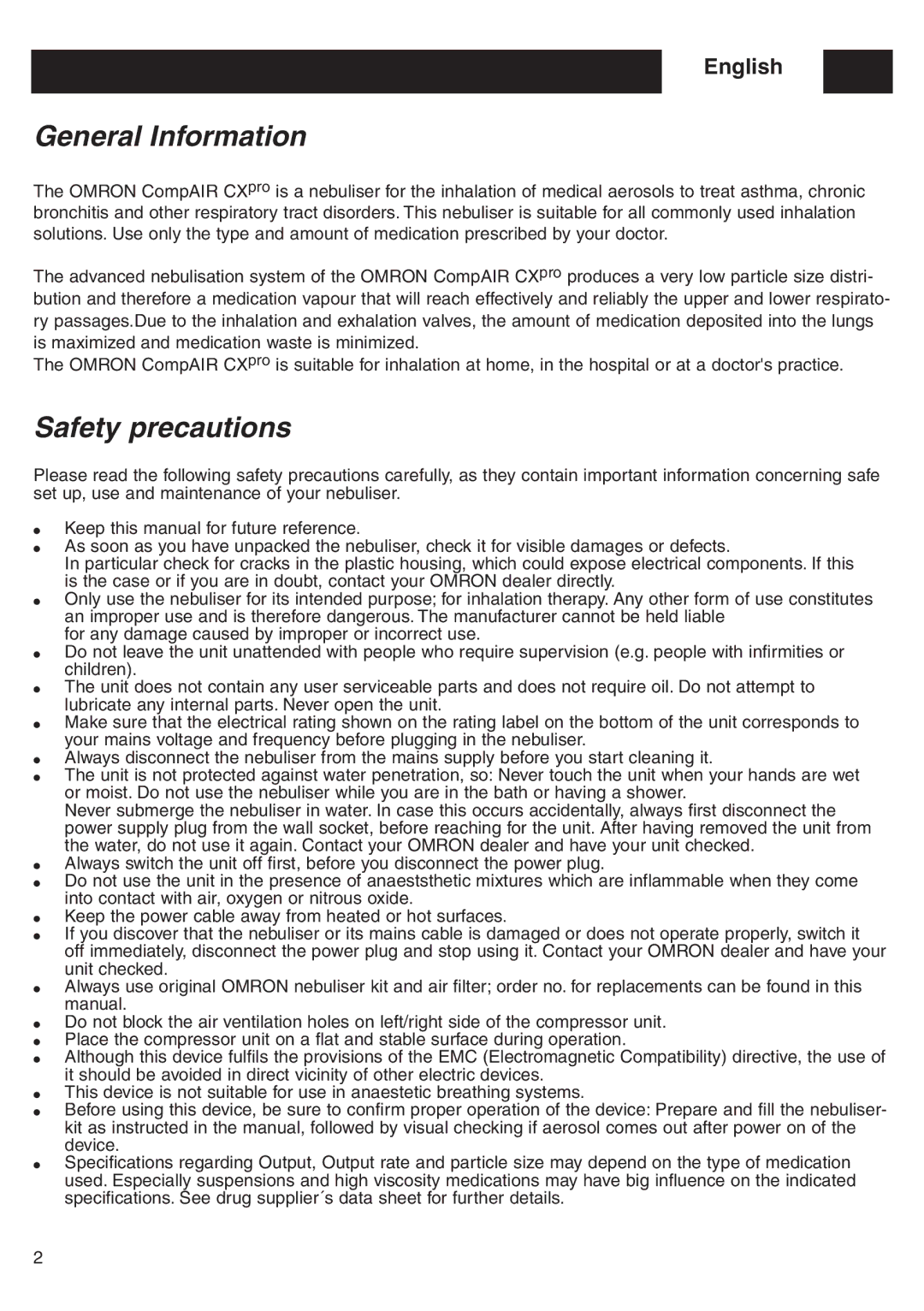English
General Information
The OMRON CompAIR CXpro is a nebuliser for the inhalation of medical aerosols to treat asthma, chronic bronchitis and other respiratory tract disorders. This nebuliser is suitable for all commonly used inhalation solutions. Use only the type and amount of medication prescribed by your doctor.
The advanced nebulisation system of the OMRON CompAIR CXpro produces a very low particle size distri- bution and therefore a medication vapour that will reach effectively and reliably the upper and lower respirato- ry passages.Due to the inhalation and exhalation valves, the amount of medication deposited into the lungs is maximized and medication waste is minimized.
The OMRON CompAIR CXpro is suitable for inhalation at home, in the hospital or at a doctor's practice.
Safety precautions
Please read the following safety precautions carefully, as they contain important information concerning safe set up, use and maintenance of your nebuliser.
●Keep this manual for future reference.
●As soon as you have unpacked the nebuliser, check it for visible damages or defects.
In particular check for cracks in the plastic housing, which could expose electrical components. If this is the case or if you are in doubt, contact your OMRON dealer directly.
●Only use the nebuliser for its intended purpose; for inhalation therapy. Any other form of use constitutes an improper use and is therefore dangerous. The manufacturer cannot be held liable
for any damage caused by improper or incorrect use.
●Do not leave the unit unattended with people who require supervision (e.g. people with infirmities or children).
●The unit does not contain any user serviceable parts and does not require oil. Do not attempt to lubricate any internal parts. Never open the unit.
●Make sure that the electrical rating shown on the rating label on the bottom of the unit corresponds to your mains voltage and frequency before plugging in the nebuliser.
●Always disconnect the nebuliser from the mains supply before you start cleaning it.
●The unit is not protected against water penetration, so: Never touch the unit when your hands are wet or moist. Do not use the nebuliser while you are in the bath or having a shower.
Never submerge the nebuliser in water. In case this occurs accidentally, always first disconnect the power supply plug from the wall socket, before reaching for the unit. After having removed the unit from the water, do not use it again. Contact your OMRON dealer and have your unit checked.
●Always switch the unit off first, before you disconnect the power plug.
●Do not use the unit in the presence of anaeststhetic mixtures which are inflammable when they come into contact with air, oxygen or nitrous oxide.
●Keep the power cable away from heated or hot surfaces.
●If you discover that the nebuliser or its mains cable is damaged or does not operate properly, switch it off immediately, disconnect the power plug and stop using it. Contact your OMRON dealer and have your unit checked.
●Always use original OMRON nebuliser kit and air filter; order no. for replacements can be found in this manual.
●Do not block the air ventilation holes on left/right side of the compressor unit.
●Place the compressor unit on a flat and stable surface during operation.
●Although this device fulfils the provisions of the EMC (Electromagnetic Compatibility) directive, the use of it should be avoided in direct vicinity of other electric devices.
●This device is not suitable for use in anaestetic breathing systems.
●Before using this device, be sure to confirm proper operation of the device: Prepare and fill the nebuliser- kit as instructed in the manual, followed by visual checking if aerosol comes out after power on of the device.
●Specifications regarding Output, Output rate and particle size may depend on the type of medication used. Especially suspensions and high viscosity medications may have big influence on the indicated specifications. See drug supplier´s data sheet for further details.
2
